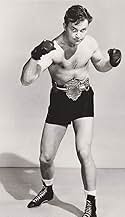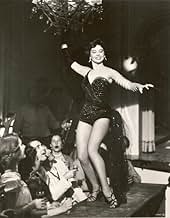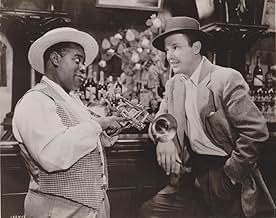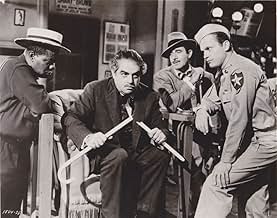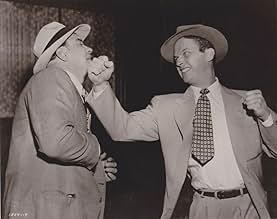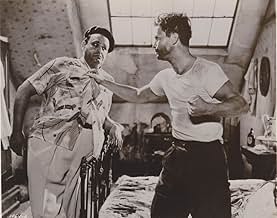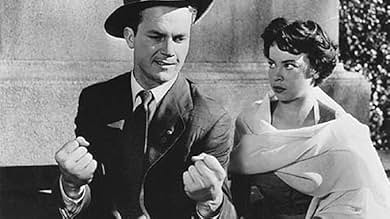Adicionar um enredo no seu idiomaAn about-to-retire New Orleans newspaper columnist tells the story of a most unforgettable character: boxer Socks Barbarossa.An about-to-retire New Orleans newspaper columnist tells the story of a most unforgettable character: boxer Socks Barbarossa.An about-to-retire New Orleans newspaper columnist tells the story of a most unforgettable character: boxer Socks Barbarossa.
- Fighter
- (não creditado)
- Waiter
- (não creditado)
Enredo
Você sabia?
- CuriosidadesNone of the songs performed in the film are listed in the on-screen credits. In addition to the songs Louis Armstrong performed in the film, he recorded another song, "It's a Most Unusual Day," by Jimmy McHugh and Harold Adamson, but it was cut. That outtake, several songs from this film, plus songs from other Louis Armstrong M-G-M films, were included on a CD anthology entitled "Now You Has Jazz: Louis Armstrong at M-G-M," released in 1997 by Rhino Records.
- Citações
Gabe Jordan: Politicians aren't New Orleans. For the real story you gotta go to the - real people. The people of desire on Piety Street. The people of piety on Desire Street. And the people of good intentions on Bourbon Street. My street. My favorite beat. It has more grifters, grafters, guzzlers, and guts than any other street in the world. Buccaneers Alley, Thieves Alley, and this stretch, the block I call Glory Alley. Glory Alley - a world of square guys with round edges. Where love with larceny, courage and crime, nobility and amorality, come out of the same barrel. Beer barrel or whiskey barrel, preferably bourbon. Life is fundamental to mugs, pugs, and lugs. You settle it with fists or rationalize it with dreams out of a bottle. Yet, in the bottom of life's gutter, you can find, if you look up hard enough, more beauty, dignity and sensitivity, than anywhere else in the world. Has beens, might have beens, never was it, and - champions.
- ConexõesEdited from Modern New Orleans (1940)
- Trilhas sonorasGlory Alley
(uncredited)
Music by Jay Livingston
Lyrics by Mack David
Sung by chorus over opening credits and at the end
Then we have Leslie Caron as his love interest. It looks like this part was hurriedly re-written for her after her triumph in AN American IN Paris. She performs ridiculous ballet routines in a seedy bar (you know the patrons would have booed her off immediately). You see she wanted to be a ballerina, but she gave it all up to support her blind father. He's played by Kurt Kaszner - an actor still in his thirties but donned with silly silver hair to make him look ancient and wise.
Then there's Louis Armstrong, sadly named "Shadow", and seemingly the only African-American in New Orleans. He's supposed to be Meeker's trainer, but he spends the whole movie playing his trumpet and leading absurd sing-a-longs at the local bar. He does have a couple of good acting scenes though. The excellent Gilbert Roland floats around the film's edges with nothing to do, while John McIntire adds pseudo profound narration to the story - told in flashback like a film noir.
Probably the worst sequence in the film, and that's saying something, is the ludicrous Korean War scene, with some stock footage, four soldiers, some sort of pine forest and a rear projected bridge deemed sufficient to portray a major world conflict.
So we have a boxing picture, a musical, a film noir, a war film, and a pseudo-Freudian psychological study all rolled into one! What more could you ask for?
It's hard to believe a fine hard-boiled director like Raoul Walsh oversaw this mess - he probably wanted to run straight back to Warner Bros afterwards.
- David-240
- 21 de mar. de 2008
- Link permanente
Principais escolhas
Detalhes
- Data de lançamento
- País de origem
- Idioma
- Também conhecido como
- Glory Alley
- Locações de filme
- Empresa de produção
- Consulte mais créditos da empresa na IMDbPro
Bilheteria
- Orçamento
- US$ 971.000 (estimativa)
- Tempo de duração1 hora 19 minutos
- Cor
- Proporção
- 1.37 : 1
Contribua para esta página


